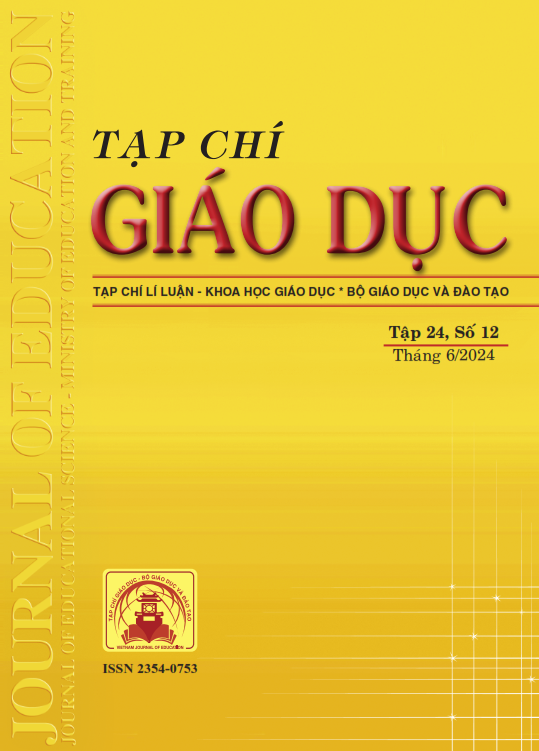Vận dụng lí thuyết giáo dục toán học gắn với thực tiễn trong dạy học Định lí Cosin (Toán 10)
Tóm tắt
Realistic Mathematics Education (RME) was developed at the Freudenthal Institute in the Netherlands in 1971 based on two perspectives: mathematics must be associated with practice and mathematics is an activity of humans. RME emphasizes the role of teaching starting from situations and problems with real contexts. This study presents a result of teaching experiments on the Cosine theorem through solving a practical problem according to RME Theory including five steps: raising a practical problem, discovering the Cosine theorem, formulating the Cosine theorem, solving Initial practical problems, and applying the Cosine theorem in practice. The experimental results show that the students actively participated in the process of discovering the Cosine theorem through solving learning tasks; Realized the close relationship between mathematics and practice, and developed independence and confidence in learning activities.
Tài liệu tham khảo
Bộ GD-ĐT (2018). Chương trình giáo dục phổ thông môn Toán (ban hành kèm theo Thông tư số 32/2018/TT-BGDĐT ngày 26/12/2018 của Bộ trưởng Bộ GD-ĐT).
Cakir, P. (2013). Effects of Realistic Mathematics Education approach on the gain scores and motivation levels of Elementary Education 4th grade students. Master's Thesis, Dokuz Eylul University, Institute of Educational Sciences, İzmir.
Freudenthal, H. (1968). Why to Teach Mathematics so as to Be Useful. Educational Studies in Mathematics, 1, 3-8.
Freudenthal, H. (1973). Mathematics as an Educational Task. Dordrecht: Reidel Publishing Company.
Freudenthal, H. (1979). Structuur der wiskunde en wiskundige structuren; een onderwijskundige analyse [Structure of mathematics and mathematical structures; an educational analysis. Pedagogische Studien, 56(2), 51-60.
Freudenthal, H. (1991). Revisiting Mathematics Education. China Lectures. Dordrecht: Kluwer Academic Publishers.
Gravemeijer, K. (1994). Developing realistic mathematics education. Utrecht: CD β Press.
Lange, D. J. (2006). Mathematical literacy for living from OECD-PISA perspective. Tsukuba Journal of Educational Study in Mathematics. Special Issue on The APECTSUKUBA International Conference “Innovative Teaching Mathematics through Lesson Study” (pp. 13-35). Tokyo, Japan: University of Tsukuba.
Laurens, T., Batlolona, F. A., Batlolona, J. R., Florence, & Leasa, M. (2017). How Does Realistic Mathematics Education (RME) Improve Students’ Mathematics Cognitive Achievement? EURASIA Journal of Mathematics, Science and Technology Education, 14(2), 569-578.
Lê Thùy Trang, Phạm Anh Giang, Nguyễn Tiến Trung (2021). Vận dụng Lí thuyết giáo dục Toán thực (Realistics Mathematics Education) trong dạy học: Một số thách thức, nguyên tắc và khuyến nghị. Tạp chí Giáo dục, 494, 37-43.
McAskill, B., Watt, W., Balzarini, E., Bonifacio, L., Carlson, S., Johnson, B., Kennedy, R., & Wardrop, H. (2011). Pre-Calculus 11. McGraw-Hill Ryerson Limited.
Nguyen, P. L, & Ngo, T. T. T (2020). Approach to Realistic Mathematics Education in teaching Mathematics: A case of Cosine Theorem - Geometry 10. International Journal Of Scientific & Technology Research, 9(4), 1173-1178.
Nguyen, T. D. (2022). Designing a teaching model based on the Realistic Mathematics Education (RME) approach and its application in teaching calculus. Journal of Mathematics and Science Teacher, 2(1), 1-10. https://doi.org/10.29333/mathsciteacher/11918
Nguyễn Danh Nam (2020). Một số vấn đề về giáo dục toán học gắn liền với thực tiễn. Tạp chí Giáo dục, 487, 15-21.
Streefland, L. (1985). Wiskunde als activiteit en de realiteit als bron. Nieuwe Wiskrant, 5(1), 60-67.
Treffers, A. (1978). Wiskobas doelgericht [Wiskobas goal-directed]. Utrecht: IOWO.
Van Den Heuvel-Panhuizen, M. (1996). Assessment and realistic mathematics education. Utrecht: CD-B Press /Freudenthal Institute, Utrecht University.
Van Den Heuvel-Panhuizen, M. (2000). Mathematics education in the Netherlands: A guided tour. Freudenthal Institute. Utrecht University.
Van Den Heuvel-Panhuizen, M. (2003). The didactical use of models in realistic mathematics education: an example from a longitudinal trajectory on percentage. Educational Studies in Mathematics, 54(1), 9-35.
Tải xuống
Đã Xuất bản
Cách trích dẫn
Số
Chuyên mục
Giấy phép

Tác phẩm này được cấp phép theo Ghi nhận tác giả của Creative Commons Giấy phép quốc tế 4.0 .












